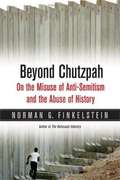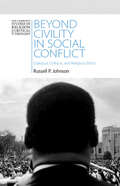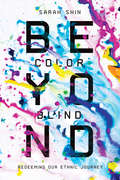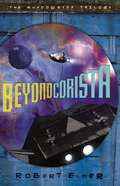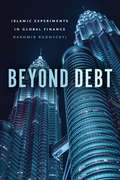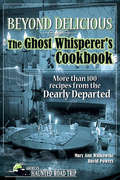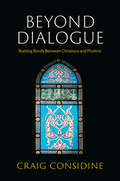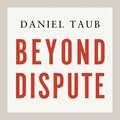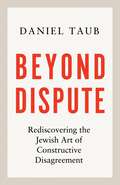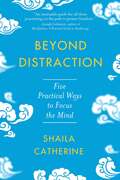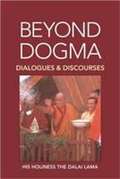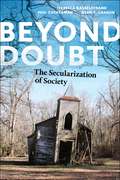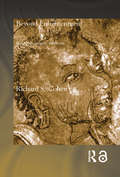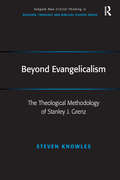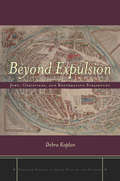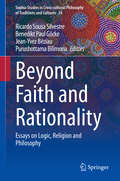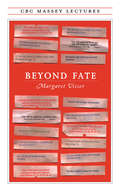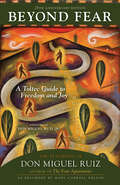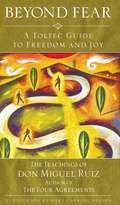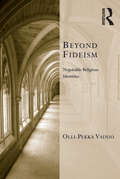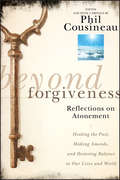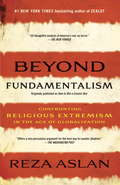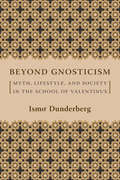- Table View
- List View
Beyond Church and State
by Matthew SchererSecularism is often imagined in Thomas Jefferson's words as 'a wall of separation between Church and State'. This book moves past that standard picture to argue that secularism is a process that reshapes both religion and politics. Borrowing a term from religious traditions, the book goes further to argue that this process should be understood as a process of conversion. Matthew Scherer studies Saint Augustine, John Locke, John Rawls, Henri Bergson and Stanley Cavell to present a more accurate picture of what secularism is, what it does, and how it can be reimagined to be more conducive to genuine democracy.
Beyond Chutzpah: On the Misuse of Anti-Semitism and the Abuse of History
by Norman G. FinkelsteinIn this sequel to his international bestseller "The Holocaust Industry", Norman G. Finkelstein moves from an iconoclastic interrogation of the new anti-Semitism to a meticulously researched expose of the corruption of scholarship on the Israel-Palestine conflict.
Beyond Civility in Social Conflict: Dialogue, Critique, and Religious Ethics (New Cambridge Studies in Religion and Critical Thought)
by Russell P. JohnsonHow can one speak and act in ways that overcome entrenched social conflicts? In polarized societies, some insist that the survival of democracy depends on people abiding by rules of civility and mutual respect. Others argue that the political situation is so dire that one's values need to be fought for by any means necessary. Across the political spectrum, people feel like they need to choose between the morality of dialogue and the effectiveness of protest. Beyond Civility in Social Conflict makes an important intervention in this debate. Taking insights from nonviolent direct action, it provides a model for advocacy that is both compassionate and critical. Successful communicators can help their opponents by dismantling the illusions and unjust systems that impede human flourishing and pit people against one another. The final chapter turns specifically to Christian ethics, and what it means to 'love your enemies' by disagreeing with them.
Beyond Colorblind: Redeeming Our Ethnic Journey
by Sarah Shin• 15th Annual Outreach Magazine Resource of the Year - Also Recommended in Racial Reconciliation • 2017 Foreword INDIES Award Finalist For a generation or so, society has tried to be colorblind. People say they don’t see race. But this approach has limitations. In our broken world, ethnicity and racial identity are often points of pain and injustice. We can’t ignore that God created us with our ethnic identities. We bring all of who we are, including our ethnicity and cultural background, to our identity and work as God's ambassadors. Ethnicity and evangelism specialist Sarah Shin reveals how our brokenness around ethnicity can be restored and redeemed, for our own wholeness and also for the good of others. When we experience internal transformation in our ethnic journeys, God propels us outward in a reconciling witness to the world. Ethnic healing can demonstrate God's power and goodness and bring good news to others. Showing us how to make space for God's healing of our ethnic stories, Shin helps us grow in our crosscultural skills, manage crosscultural conflict, pursue reconciliation and justice, and share the gospel as ethnicity-aware Christians. Jesus offers hope for healing, both for ourselves and for society. Discover how your ethnic story can be transformed for compelling witness and mission.
Beyond Corista (The Shadowside Trilogy)
by Robert ElmerThose who live in lush comfort on the bright side of the small planet Corista have plundered the water resources of Shadowside for centuries, ignoring the existence of Shadowside’s inhabitants, who are nothing more than animals. Or so the Brightsiders have been taught. It will take a special young woman to expose the truth—and to help avert the war that is sure to follow. A course they can’t choose, a warning no one will believe… Oriannon and her friends Margus and Wist hurtle through space on a dangerous mission, guided by the pilot stone. Their enemy, Sola, is on board as well, and Oriannon soon begins to regret rescuing the blind woman from battle. As the odd crew flies from way station to way station, Oriannon delivers the warning she received from Jesmet—a race called the Troikans is coming to destroy Corista. At each location, Oriannon is met with the same disbelief: no one has seen a Troikan in years. Soon, even Oriannon begins to wonder if the threat is real. Are her visits from Jesmet only a hallucination? Oriannon must find the faith to race toward a destination only she can see.
Beyond Debt: Islamic Experiments in Global Finance
by Daromir RudnyckyjRecent economic crises have made the centrality of debt, and the instability it creates, increasingly apparent. This realization has led to cries for change—yet there is little popular awareness of possible alternatives. Beyond Debt describes efforts to create a transnational economy free of debt. Based on ethnographic fieldwork in Malaysia, Daromir Rudnyckyj illustrates how the state, led by the central bank, seeks to make the country’s capital Kuala Lumpur “the New York of the Muslim world”—the central node of global financial activity conducted in accordance with Islam. Rudnyckyj shows how Islamic financial experts have undertaken ambitious experiments to create more stable economies and stronger social solidarities by facilitating risk- and profit-sharing, enhanced entrepreneurial skills, and more collaborative economic action. Building on scholarship that reveals the impact of financial devices on human activity, he illustrates how Islamic finance is deployed to fashion subjects who are at once more pious Muslims and more ambitious entrepreneurs. In so doing, Rudnyckyj shows how experts seek to create a new “geoeconomics”—a global Islamic alternative to the conventional financial network centered on New York, London, and Tokyo. A groundbreaking analysis of a timely subject, Beyond Debt tells the captivating story of efforts to re-center international finance in an emergent Islamic global city and, ultimately, to challenge the very foundations of conventional finance.
Beyond Delicious: The Ghost Whisperer's Cookbook
by Mary Ann Winkowski David PowersBeyond Delicious: The Ghost Whisperer's Cookbook includes more than 100 recipes given to her through communication with spirits of great cooks who have passed on. Arranged as 2-page spreads, each entry includes a recipe as well as the story of how the author came to learn it. Beyond Delicious, then, is part cookbook and part ghost story anthology. Together these elements create the most entertaining cookbook of the season.
Beyond Dialogue: Building Bonds Between Christians and Muslims
by Craig ConsidineIn these times of rising tensions between Christians and Muslims across the world, the need for harmony and peace has never been more urgent. As one of the world’s leading advocates of interfaith dialogue, Craig Considine introduces readers to the provocative idea of the Synthesis of Civilizations, a theory that pushes beyond dialogue to show where and how Western and Islamic civilizations have been – and continue to be – in a deeper union with one another.With an open mind and a deep appreciation of the Abrahamic tradition, Considine takes readers on a fascinating journey across history and the current state of Christian–Muslim relations in seven “battleground” regions of the world. Alongside the undeniable tensions between Christians and Muslims, the book presents and applies an interfaith community-building tool – DEUCE – focused on dialogue, education, understanding, commitment, and engagement. With unprecedented civilizational scope and sweeping sociological insight, Considine does full justice to the religious and social bonds between Christianity and Islam.While daily headlines highlight the shared fear, persecution, and violence experienced by Christians and Muslims worldwide, Beyond Dialogue is intended to inspire interfaith bridge builders who are passionate about defending and promoting civility, humanity, and pluralism on the world stage.
Beyond Dispute: Rediscovering the Jewish art of constructive disagreement
by Daniel TaubFiercely divisive times call for radically different arguments.In our age of seemingly irreconcilable differences, argument is increasingly seen as a plague to be avoided or a contest to be won. Daniel Taub, an experienced peace negotiator and diplomat, argues that ancient Jewish wisdom offers a third way. Drawing from this tradition, and from his own experience at the heart of some of the world's toughest negotiations, in Beyond Dispute he makes the case for a radically different approach to help us come closer to truth and to each other.This approach sees argument not as a combat zone but as a joint enterprise, and its disputants not as jealous custodians of competing truths, but collaborative explorers. It seeks to create safe spaces not by outlawing controversial opinions but by welcoming them, and it offers a set of practical tools to rethink our own preconceptions. In fractious times it charts a way to build communities and societies that are resilient enough to face new and challenging ideas without fear.Weaving ancient insights with contemporary research in conflict resolution, as well as behind-the-scenes personal stories of diplomacy and negotiations, Beyond Dispute is a passionate call to rediscover and harness the vital and surprising power of a good argument.
Beyond Dispute: Rediscovering the Jewish art of constructive disagreement
by Daniel TaubFiercely divisive times call for radically different arguments.In our age of seemingly irreconcilable differences, argument is increasingly seen as a plague to be avoided or a contest to be won. Daniel Taub, an experienced peace negotiator and diplomat, argues that ancient Jewish wisdom offers a third way. Drawing from this tradition, and from his own experience at the heart of some of the world's toughest negotiations, in Beyond Dispute he makes the case for a radically different approach to help us come closer to truth and to each other.This approach sees argument not as a combat zone but as a joint enterprise, and its disputants not as jealous custodians of competing truths, but collaborative explorers. It seeks to create safe spaces not by outlawing controversial opinions but by welcoming them, and it offers a set of practical tools to rethink our own preconceptions. In fractious times it charts a way to build communities and societies that are resilient enough to face new and challenging ideas without fear.Weaving ancient insights with contemporary research in conflict resolution, as well as behind-the-scenes personal stories of diplomacy and negotiations, Beyond Dispute is a passionate call to rediscover and harness the vital and surprising power of a good argument.
Beyond Dispute: Rediscovering the Jewish art of constructive disagreement
by Daniel TaubFiercely divisive times call for radically different arguments.In our age of seemingly irreconcilable differences, argument is increasingly seen as a plague to be avoided or a contest to be won. Daniel Taub, an experienced peace negotiator and diplomat, argues that ancient Jewish wisdom offers a third way. Drawing from this tradition, and from his own experience at the heart of some of the world's toughest negotiations, in Beyond Dispute he makes the case for a radically different approach to help us come closer to truth and to each other.This approach sees argument not as a combat zone but as a joint enterprise, and its disputants not as jealous custodians of competing truths, but collaborative explorers. It seeks to create safe spaces not by outlawing controversial opinions but by welcoming them, and it offers a set of practical tools to rethink our own preconceptions. In fractious times it charts a way to build communities and societies that are resilient enough to face new and challenging ideas without fear.Weaving ancient insights with contemporary research in conflict resolution, as well as behind-the-scenes personal stories of diplomacy and negotiations, Beyond Dispute is a passionate call to rediscover and harness the vital and surprising power of a good argument.
Beyond Distraction: Five Practical Ways to Focus Your Mind
by Shaila CatherineLearn how to overcome distraction in meditation practice and develop clarity in your relationships, work, and activities with this new guide from a beloved meditation teacher.The mind can be a potent tool, used to guide extraordinary achievements, inspire good works, and incline your spiritual path toward peace and awakening. But the mind can also produce thoughts that lead to suffering. For many people, thoughts run rampant and seem to oppress or control their lives. Even the Buddha tells us that before his enlightenment, he sometimes found his mind preoccupied by thoughts connected with sensual desire, ill will, and harm. But he figured out how to respond to thoughts skillfully and developed a step-by-step approach to calm the restless mind. Now, Insight Meditation teacher Shaila Catherine offers an accessible approach to training the mind that is guided by the Buddha&’s pragmatic instructions on removing distracting thoughts. Drawing on two scriptures in the Middle Length Discourses of the Buddha, Shaila shows you how to overcome habitual modes of thinking, develop deeper concentration, and discover the insights into emptiness that are vital for a liberating spiritual path. Following the Buddha&’s pragmatic approach, Shaila guides you through five steps for overcoming distraction and focusing the mind: 1. Replace unwholesome thoughts with wholesome thoughts. For example, if you find yourself thinking thoughts of ill will toward a person, try thinking instead of their good qualities as an antidote. 2. Examine the dangers of distracting thoughts. Weigh the costs of allowing thoughts of ill will, lust, greed, and so forth to obsess your mind. The costs of dwelling on distracting thoughts nearly always outweigh any supposed benefits. 3. Avoid it, ignore it, forget it. Develop the skill to turn your attention away from habitual distractions. Remove the fuel and let the fires of distraction die out. 4. Investigate the causes of distraction. By understanding the conditions that perpetuate habitual thoughts, you can learn to free yourself from those patterns. 5. Apply determination and resolve. Supported by wisdom, you can make a firm decision to stop dwelling on patterns of thought that are not supporting your deepest values and goals in life. Each chapter includes exercises and reflections to help you cultivate the five steps to deeper concentration. You&’ll learn about your mind and develop your ability to direct your attention more skillfully in meditation and daily activities. And ultimately, you&’ll discover for yourself how these five steps boil down to one key realization: In the moment you recognize that a thought is just a thought, you will find yourself on the path to a life of remarkable freedom.
Beyond Dogma: Dialogues And Discourses
by Alison Anderson Dalai Lama Xiv Marianne Dresser Steven GoodmanBeyond Dogma presents a record of a 1993 visit to France by His Holiness the Dalai Lama, recipient of the 1989 Nobel Peace Prize and the world's most prominent Buddhist leader. During a series of public lectures and question-and-answer sessions with political activists, religious leaders, students, scientists, Buddhist practitioners, and interfaith organizations, His Holiness responds to a wider range of contemporary social, political, and religious issues. Topics include the practice of Buddhism in the West; nonviolence, human rights, and the Tibetan crisis; ecumenical approaches to spirituality; the meeting of Buddhism and science; and more.
Beyond Doubt: The Secularization of Society (Secular Studies #7)
by Phil Zuckerman Ryan T. Cragun Isabella KasselstrandDemonstrates definitively that the secularization thesis is correct, and religion is losing its grip on societies worldwideIn the decades since its introduction, secularization theory has been subjected to doubt and criticism from a number of leading scholars, who have variously claimed that it is wrong, flawed, or incomplete. In Beyond Doubt, Isabella Kasselstrand, Phil Zuckerman, and Ryan T. Cragun mount a strong defense for the theory, providing compelling evidence that religion is indeed declining globally as a result of modernization. Though defenses of secularization theory have been mounted in the past, we now have many years’ worth of empirical data to illuminate trends, and can trace changes not just at a given point in time but over a trajectory. Drawing on extensive survey data from nations around the world, the book demonstrates that, in spite of its many detractors, there is robust empirical support for secularization theory. It also engages with the most prominent criticisms levied against the theory, showing that data that are said to refute the narrative of religious decline are easily explainable and in keeping with the broader tendency toward secularization. Beyond simply defending secularization theory, the authors endeavor to formalize it, offering clear definitions of relevant terms and creating propositions that can be repeatedly and accurately tested. Beyond Doubt offers the strongest argument to date for the existence of a global secularization trend, and will be a vital resource for students and scholars alike who study religion and secularism.
Beyond Enlightenment: Buddhism, Religion, Modernity (Routledge Critical Studies in Buddhism)
by Richard CohenThe vast majority of books on Buddhism describe the Buddha using the word enlightened, rather than awakened. This bias has resulted in Buddhism becoming generally perceived as the eponymous religion of enlightenment. Beyond Enlightenment is a sophisticated study of some of the underlying assumptions involved in the study of Buddhism (especially, but not exclusively, in the West). It investigates the tendency of most scholars to ground their study of Buddhism in these particular assumptions about the Buddha’s enlightenment and a particular understanding of religion, which is traced back through Western orientalists to the Enlightenment and the Protestant Reformation. Placing a distinct emphasis on Indian Buddhism, Richard Cohen adeptly creates a work that will appeal to those with an interest in Buddhism and India and also scholars of religion and history.
Beyond Evangelicalism: The Theological Methodology of Stanley J. Grenz (Routledge New Critical Thinking in Religion, Theology and Biblical Studies)
by Steven KnowlesA prolific author and thinker, Stanley J. Grenz was a respected and influential figure, not only within evangelicalism but in the wider theological world. Amongst the many issues tackled by him it is perhaps his revisioning of evangelical theology in the light of the postmodern challenge that has caused the biggest stir in the theological world. Advocating a nonfoundationalist methodology, Grenz attempts to re-position evangelical theology in line with postmodern concerns. This work examines the main traits of postmodern thought that would seem to directly challenge how evangelical theology is traditionally done. An examination of the seminal influences on Grenz will be traced in order to understand more fully the position he takes. A rigorous critique and assessment of his theological methodology will follow with the conclusion that his work goes beyond evangelicalism. This will be the first book length treatment on Grenz's work on theological methodology and therefore will break new ground in this important area of study.
Beyond Expulsion
by Debra KaplanBeyond Expulsionis a history of Jewish-Christian interactions in early modern Strasbourg, a city from which the Jews had been expelled and banned from residence in the late fourteenth century. This study shows that the Jews who remained in the Alsatian countryside continued to maintain relationships with the city and its residents in the ensuing period. During most of the sixteenth century, Jews entered Strasbourg on a daily basis, where they participated in the city's markets, litigated in its courts, and shared their knowledge of Hebrew and Judaica with Protestant Reformers. By the end of the sixteenth century, Strasbourg became an increasingly orthodox Lutheran city, and city magistrates and religious leaders sought to curtail contact between Jews and Christians. This book unearths the active Jewish participation in early modern society, traces the impact of the Reformation on local Jews, discusses the meaning of tolerance, and describes the shifting boundaries that divided Jewish and Christian communities.
Beyond Faith and Rationality: Essays on Logic, Religion and Philosophy (Sophia Studies in Cross-cultural Philosophy of Traditions and Cultures #34)
by Purushottama Bilimoria Benedikt Paul Göcke Ricardo Sousa Silvestre Jean-Yvez BéziauThis volume deals with the relation between faith and reason, and brings the latest developments of modern logic into the scene. Faith and rationality are two perennial key concepts in the history of ideas. Philosophers and theologians have struggled to bring into harmony these otherwise conflicting concepts. Despite the diversity of approaches about what rationality effectively means, logic remains the cannon of objective and rational thought. The chapters in this volume analyze several issues pertaining to the philosophy of religion and philosophical theology from the perspective of their relation to logic and the benefit they can derive from the use of modern logic tools. The book is divided into five parts: (I) Introduction, (II) Analytic Philosophy of Religion, (III) Logical Philosophy of Religion, (IV) Computational Philosophy and Religion and (V) Logic, Language and Religion. This text appeals to students and researchers in the field.
Beyond Fate (The CBC Massey Lectures)
by Margaret VisserIn spite of modern ideals and achievements in the area of freedom and choice, people today are often afflicted with a sense that they cannot change things for the better. They feel helpless, constrained, caught -- in a word, fatalistic. Beyond Fate, Margaret Visser's 2002 CBC Massey Lectures, examines why. This timely and important book investigates what fate means, and where the propensity to believe in it and accept it comes from. Visser takes an ancient metaphor -- ubiquitous, influential, perhaps unavoidable -- where time is "seen" and spoken of as though it were space; she examines how this way of picturing reality can be a useful tool to think with -- or, on the other hand, may lead us into disastrous misunderstandings. There are ways out. But first, by observing how fatalism manifests itself in our daily lives, in everything from table manners and shopping to sport, we understand our profound attachment to fate, so that we can consider its role in our lives and our cultures.
Beyond Fear: A Toltec Guide to Freedom and Joy: The Teachings of Don Miguel Ruiz
by Don Miguel Ruiz Mary Carroll Nelson Don Miguel Ruiz, Mary Carroll NelsonIn order to practice the Four Agreements, before we can achieve the Mastery of Love, we must move Beyond Fear. Fear is the source of all the negative agreements we've made with life. It can alienate us from the joy that is our birthright. When we are able to look at our lives and our worlds without fear or judgments, we realize that this dream we are dreaming—reality—can be whatever we want it to be. Don Miguel Ruiz is a nagual initiated as a Master of Intent in the Toltec tradition. Seekers of the Toltec way to freedom and joy follow a ritual procession along the main passageway in Teotihuacan as they move beyond fear into a state of empowerment. This comprehensive guide to the teachings of don Miguel Ruiz includes:- the basic elements of Toltec wisdom and the spiritual practice that is the basis of The Four Agreements - exercises and ceremonies to walk readers through the process of shedding fear, judgment, and guilt - biographical information on don Miguel Ruiz and his training with his curandera mother, the famous healer, Mother SaritaThe knowledge contained in this life-changing volume has the power to replace fear with joy.
Beyond Fear: A Toltec Guide to Freedom and Joy: The Teachings of Don Miguel Ruiz
by Don Ruiz Mary Carroll NelsonThe wisdom in this life-changing book has the power to replace fear with joy. Fear, the source of all the negative agreements we've made in life, can alienate us from the joy that is our birthright. When we are able to look at our lives and our worlds without fear or judgment, we realize that this dream we are dreaming - reality - can be whatever we want it to be.
Beyond Fideism: Negotiable Religious Identities (Transcending Boundaries in Philosophy and Theology)
by Olli-Pekka VainioAfter the postmodern turn, every tradition seeks the right to have their own rules of rational discourse. The crucial question is: are there ways to communicate between the traditions so that the traditions do not need to give up their identities in order to take part in conversation? Vainio examines the basic assumptions behind well known types of Christian theology and seeks ways in which they might interact with one other and with other non-Christian traditions without capitulation of their identities. Vainio claims that there are religious identities that can be negotiated and communicated, and that there are ecclesiastical doctrines which can be meaningfully discussed among churches. This book explores three key areas: analysis of the uses of 'fideism' within classical Christian theology; clarification of different types of theological method that seek to express the task of theology in contemporary setting; an explanation of the contours of religious identity and rationality which takes seriously both classical Christian identity and pluralistic contexts where most of the Christian communities dwell nowadays. The proposal for "negotiability" of Christian identity draws together ideas from, among others, virtue epistemology, reformed epistemology, communitarianism, and feminist sensibilities.
Beyond Forgiveness
by Phil Cousineau"If we harbor thoughts of violence or hatred, or seek revenge or retribution, we are contributing to the wounding of the world; if we transform those thoughts into forgiveness and compassion, and then move beyond them to actually make amends or restitution, we are contributing to the healing of the world. This timely, powerful and compassionate book helps show us the way. " -Deepak Chopra "Nothing will help us survive the present age more than breaking the tragic cycles of violence and revenge that threaten our very existence. To do so, we must honor our soul's desire for deeper forms of reconciliation, a process that Phil Cousineau reveals here as being on the other side of forgiveness, in the ancient ritual of atonement. His book is a profoundly important contribution to the healing of the world, and I give it my blessing. " -Robert A. Johnson, author of Transformation, Inner Work and Owning Your Own Shadow As indispensable as forgiveness has been to the healing process throughout history, there is another equally profound action that is needed for ultimate reconciliation, which Arun Gandhi, grandson of Mohandas Gandhi, calls "the other side of the coin. " Turning over the coin of forgiveness, we discover atonement, the half-hidden, much-overlooked other half of the reconciliation process. Beyond Forgiveness shows how acts of atonement-making amends, providing restitution, restoring balance-can relieve us of the pain of the past and give us a hopeful future. This rich and powerful book includes 15 thoughtful contributions by high-profile thinkers and activists including Huston Smith, Michael Bernard Beckwith, Azim Khamisa, Rabbi Michael Lerner, Jacob Needleman, Michael Nagler, Diane Hennacy Powell, James O'Dea, Arun Gandhi, Kate Dahlstedt, Ed Tick, Richard J. Meyer, Rev. Heng Sure, Douglas George-Kanentiio and Katharine Dever. Atonement is put forward as a process that we must all learn to practice-from individuals to nations-if we are to heal our wounds and move forward.
Beyond Fundamentalism: Confronting Religious Extremism in the Age of Globalization
by Reza AslanThe wars in the Middle East have become religious wars in which God is believed to be directly engaged on behalf of one side against the other. The hijackers who attacked America on September 11, 2001, thought they were fighting in the name of God. According to award-winning writer and scholar of religions Reza Aslan, the United States, by infusing the War on Terror with its own religiously polarizing rhetoric, is fighting a similar war-a war that can't be won. Beyond Fundamentalism is both an in-depth study of the ideology fueling al-Qa'ida, the Taliban, and like-minded militants throughout the Muslim world and an exploration of religious violence in Judaism, Christianity, and Islam. At a time when religion and politics increasingly share the same vocabulary and function in the same sphere, Aslan writes that we must strip the conflicts of our world of their religious connotations and address the earthly grievances that always lie at its root. How do you win a religious war? By refusing to fight in one. Featuring new content and updated analysis. Originally published as How to Win a Cosmic War.
Beyond Gnosticism: Myth, Lifestyle, and Society in the School of Valentinus
by Ismo DunderbergValentinus was a popular, influential, and controversial early Christian teacher. His school flourished in the second and third centuries C.E. Yet because his followers ascribed the creation of the visible world not to a supreme God but to an inferior and ignorant Creator-God, they were from early on accused of heresy, and rumors were spread of their immorality and sorcery.Beyond Gnosticism suggests that scholars approach Valentinians as an early Christian group rather than as a representative of ancient "Gnosticism"-a term notoriously difficult to define. The study shows that Valentinian myths of origin are filled with references to lifestyle (such as the control of emotions), the Christian community, and society, providing students with ethical instruction and new insights into their position in the world. While scholars have mapped the religio-historical and philosophical backgrounds of Valentinian myth, they have yet to address the significance of these mythmaking practices or emphasize the practical consequences of Valentinians' theological views. In this groundbreaking study, Ismo Dunderberg provides a comprehensive portrait of a group hounded by other Christians after Christianity gained a privileged position in the Roman Empire.Valentinians displayed a keen interest in mythmaking and the interpretation of myths, spinning complex tales about the origin of humans and the world. As this book argues, however, Valentinian Christians did not teach "myth for myth's sake." Rather, myth and practice were closely intertwined. After a brief introduction to the members of the school of Valentinus and the texts they left behind, Dunderberg focuses on Valentinus's interpretation of the biblical creation myth, in which the theologian affirmed humankind's original immortality as a present, not lost quality and placed a special emphasis on the "frank speech" afforded to Adam by the supreme God. Much like ancient philosophers, Valentinus believed that the divine Spirit sustained the entire cosmic chain and saw evil as originating from conspicuous "matter." Dunderberg then turns to other instances of Valentinian mythmaking dominated by ethical concerns. For example, the analysis and therapy of emotions occupy a prominent place in different versions of the myth of Wisdom's fall, proving that Valentinians, like other educated early Christians, saw Christ as the healer of emotions. Dunderberg also discusses the Tripartite Tractate, the most extensive account to date of Valentinian theology, and shows how Valentinians used cosmic myth to symbolize the persecution of the church in the Roman Empire and to create a separate Christian identity in opposition to the Greeks and the Jews.

